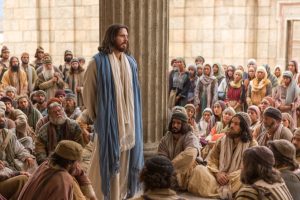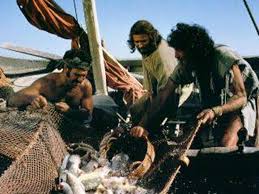Teaching is not what Jesus did; it’s who he was
 This Gospel sets us pondering what is important in our lives. The man in the incident Luke describes holds a world view that is fairly exclusive, doesn’t he? It’s just him and HIS things. Now he’s shocked to learn that he is about to lose his life. What good are his possessions going to be to him now? Jesus makes his opinion quite plain. “You fool! This very night your life will be taken away. To whom will everything belong then?!”
This Gospel sets us pondering what is important in our lives. The man in the incident Luke describes holds a world view that is fairly exclusive, doesn’t he? It’s just him and HIS things. Now he’s shocked to learn that he is about to lose his life. What good are his possessions going to be to him now? Jesus makes his opinion quite plain. “You fool! This very night your life will be taken away. To whom will everything belong then?!”
As the story goes, the man is disgruntled over a long-standing disagreement with his brother. And it sounds like he thinks he is justified in his complaint. So, he figures he will follow the customary practice of taking his dispute to the rabbi. (Expecting the rabbi, of course, take his part and set his brother right.) He further thinks maybe this new rabbi, the one he’s heard everyone talking about, won’t know about his reputation for pettiness. Surely he will get a favorable settlement for the row against his brother. But, surprise! Jesus refuses to take the case. Instead, Jesus gives the squabbling brothers a parable to “mull over”.
And, what’s the point of Jesus’ story? It’s not even remotely related to the problem that the two brothers are having. It features a wealthy landowner that doesn’t describe either of the siblings. Then Jesus lumps the boys in the same pot as the landowner. He calls them all “fools”.
Better take fair warning, Boys. And all you other listeners, too. There is danger in thinking this parable applies only to “those rich people.” To put the matter more pointedly, thinking of those rich fools enables me NOT to think of myself as a “rich fool.”
This a lesson about covetousness and jealousy. Envy is related but perhaps less “green.” You’ve heard the expression “green with envy.” Envy, like jealousy, is a desire to have what the other has but it’s maybe a little less “green”. It’s a desire to ALSO have what the other has. But not like jealousy wanting to have it INSTEAD of the other. Envy says: “I wish I could go too.” “I wish I could be as gentle and kind as she is.” Envy does begrudge the gifts of the other. It’s a prompt to imitate the others’ Christian example.
In this little parable Jesus probes our hearts. “Where is your treasure?” he asks. Don’t make the mistake that this farmer made. Examine my story. Just what is the farmer’s error. He wasn’t wicked. He didn’t gain his wealth illegally or by taking advantage of others. He’s not particularly greedy. So, what’s wrong with building larger barns, renting a storage unit, getting a POD in the back yard to store away some of today’s bounty for a leaner tomorrow? This kind of thinking can lead us to ask: Is there anything wrong with hanging on to clothing we’ve outgrown but might wear again someday? Or stockpiling furniture that serves only as a “catch all” because it’s just too nice to give away. What about requesting more allowance than we actually need? But, never finding a charity other than ourselves. Or accepting, or worse asking for money gifts or gift cards from lay people giving them the impression that our community does not take care of our needs. We might answer that none of this sounds so terribly wrong compared to the horrors of violence … except for two things.
made. Examine my story. Just what is the farmer’s error. He wasn’t wicked. He didn’t gain his wealth illegally or by taking advantage of others. He’s not particularly greedy. So, what’s wrong with building larger barns, renting a storage unit, getting a POD in the back yard to store away some of today’s bounty for a leaner tomorrow? This kind of thinking can lead us to ask: Is there anything wrong with hanging on to clothing we’ve outgrown but might wear again someday? Or stockpiling furniture that serves only as a “catch all” because it’s just too nice to give away. What about requesting more allowance than we actually need? But, never finding a charity other than ourselves. Or accepting, or worse asking for money gifts or gift cards from lay people giving them the impression that our community does not take care of our needs. We might answer that none of this sounds so terribly wrong compared to the horrors of violence … except for two things.
Notice what the farmer’s consistent focus is. “What should I do? I have no place to store my crops?” “I will do this: I will pull down my barns and build larger ones, and there I will store all my grain and my goods.” It’s his relentless use of “I” and “my” that betray a preoccupation with self. He’s fallen prey to worshiping the most popular of gods: the Unholy Trinity of “me, myself, and I.” He gives no thought to using the abundance to help others. This most likely is what leads to a second mistake: foolishness in thinking that making provision for the future; will secure one’s future.
Jesus used the opportunity as a “teachable moment.” Life, he impresses upon us, does not consist in things; not even in having MANY things. The farmer in the parable is a rich man, who fears that is not rich enough. Jesus didn’t judge him; He did teach. He was teaching all of us how to live. To paraphrase President Joe Biden’s words in his speech at the Democratic convention, when he referred to his wife who was a teacher: “Teaching is not what Jesus did; it’s who he was.”
~by Sister Roberta Bailey, OSB
First Reading Ecclesiastes 1:2; 2:21-23 Second Reading Colossians 3:1-5,9-11
Gospel Reading Luke 12:13-21
Continue Reading










